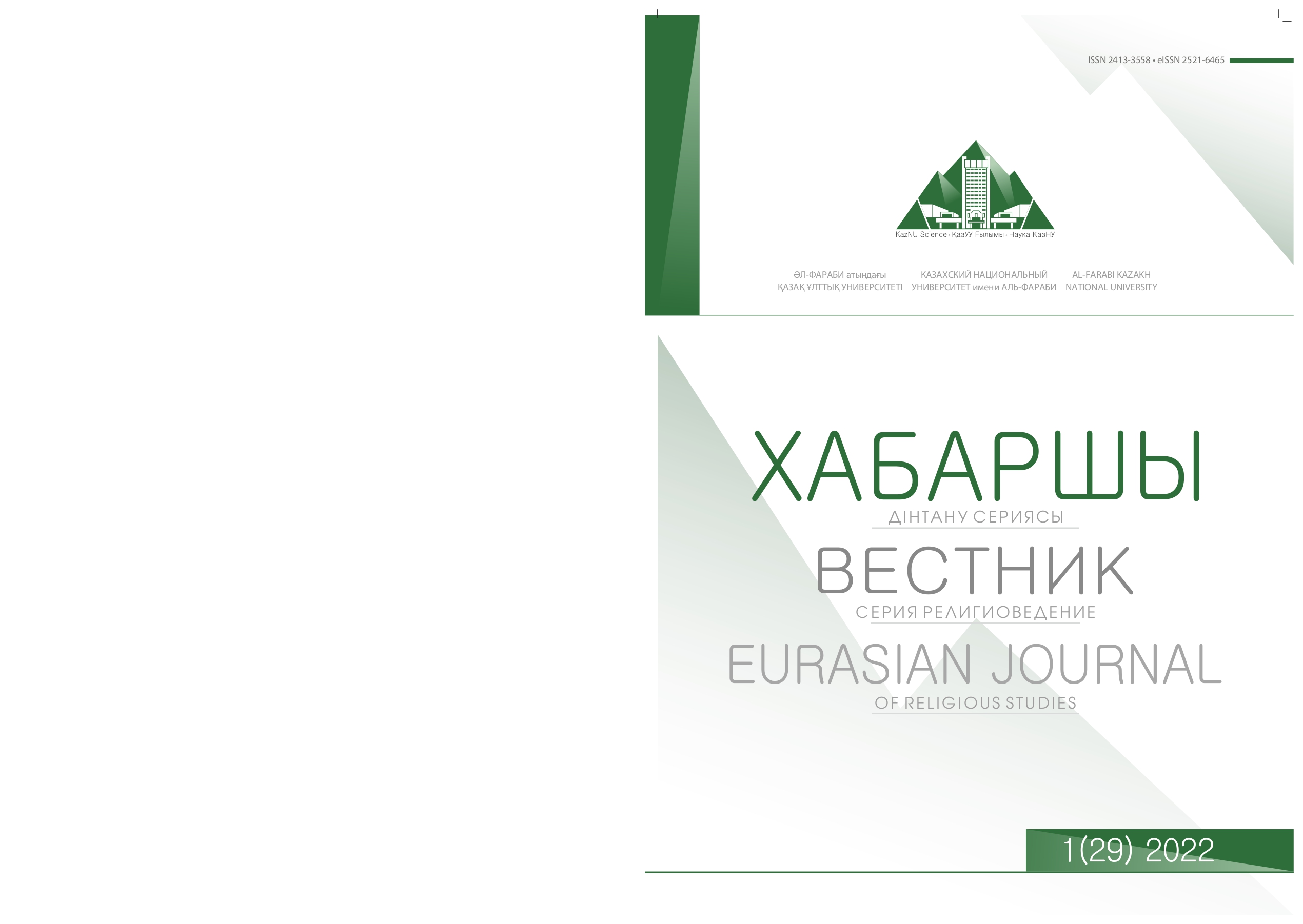The Concept of "Perfect Man" and its axiological meaning
DOI:
https://doi.org/10.26577//EJRS.2022.v29.i1.r5Keywords:
Perfect Man, Ibn Arabi, Tasawwuf, Muslim Thinkers, IslamAbstract
The article discusses the concept of "Perfect Man", which has recently been revived in Kazakhstani society. The idea of a perfect man, which originated with such Muslim thinkers as Ibn Arabi, occupies a special place in the teachings of Sufism and existed in the Kazakh steppes before Abai. The definitions of the concept of a perfect person by Muslim thinkers, the features of various aspects of this concept, the meaning in Sufism, the importance of revealing the general axiological value are given. To what extent can the concept of the “Perfect Man” contribute to the prevention of such problems of modern society as the loss of human qualities, religious intolerance, the loss of spiritual and moral values, human degradation, and so on? Along with the answer to this question, the image of a person deprived of humanity is considered, as well as the image of a spiritually filled person, their significance for society. Saying that the "Perfect Man" leads the world and society in the right direction, also condemns bad habits among people, but rather promotes order in the life of every person. Here, issues related to the formation of a new life were discussed in detail, thereby focusing on the background of a good knowledge of objects and phenomena. The task of a perfect person is to delve into the phenomena of the universe, to form life skills based on truth.
Key words: Perfect Man, Ibn Arabi, tasawwuf, Muslim thinkers, Islam
References
Akot B. (2013) Degerler egitimi acisindan insani kamil dusuncesi ve gunumuzde karsilasilan zorluklar. Journal of Islamic Research. №24 (11). – 56-70.
Asim Efendi (1305) Kamus tercemesi. – Istanbul: T.C. Türkiye Yazma Eserler Kurumu Başkanlığı. C. II. – 871-873.
Cebecioglu E. (2004) Tasavvuf terimleri deyimleri sozlugu. – Istanbul: Anka yayinlari. – 302.
Cili A. (1383/1963) El-Insanul-kamil. I-II. – Istanbul: Kitsan. – 471.
Kilic E. (2015) Muhyiddin Ibnul-Arabi, DIA. С. XX. – Istanbul: Diyanet Vakfi. – 493-516.
Kilic E. (2015) Ibnul Arabi. – Istanbul: ISAM yayinlari. – 126-127.
Muhiddinov M., Eltazarov J. (2014) Ali Sîr nevâyî’nin eserlerinde kâmil insan kavraminin yorumuve onun çağdaş «insani gelişim» düşüncesiyle felsefi-estetik açidan bağlantilari // Düşüncesiyle Felsefi-Estetik Açıdan Bağlantıları”. Türk Dünyası Bilgeler Zirvesi: Gönül Sultanları Buluşması. 26-28 Mayıs Eskişehir 2013. – Eskişehir: Türk Dünyası Kültür Başkenti Ajansı (TDKB). – 489-499.
Navoiy A. (1960) Hamsa, Tenkidi Metin, Neşrge tayyarlavçi P.Şemsiyev. – Taşkent: Fan. –48.
Nesefi A. (1997) Hakikatlerin ozu (Zubdetul hakakik), cev.: M. Murat Tamar. – Istanbul: Insan Yayinlari. – 112.
Simsek H. (2016) Tasavvufi dusuncede kamil insan karakteri ve insasi. Uluslararasi kişilik ve karakter inşâsinda dinin yeri sempozyumu. 10-12 haziran 2016. – Ordu: Ordu universitesi. – 431-441.
Sinanoglu A. (2008) Islâm düşüncesinde "insan-i kâmil" anlayişi ve Allah ile ilişkilendirilmesinin teolojik değeri // KELAM ARAŞTIRMALARI DERGISI 6:2. – Ankara: Yayin. – 93-114.
Анарбаев Н., Әкімханов А. (2015) Құран Кәрім (қазақша түсіндірмелі аударма). – Алматы: «Көкжиек» баспасы. – 624.
Қажыбай А. «Толық адам» тағылымы // https://egemen.kz/article/254633-tolyq-adam-taghylymy
Омаров Д. Абай толық адам туралы // https://adebiportal.kz/kz/news/view/abai_tolik_adam_turali__22874
References
Akot B. (2013) Degerler egitimi acisindan insani kamil dusuncesi ve gunumuzde karsilasilan zorluklar [The idea of human perfection in terms of values education and the difficulties encountered today]. Journal of Islamic Research. №24 (11). – 56-70. (in Turkish)
Anarbaev N., Ukimkhanov A. (2015) Qur`an Karim [Kazakh explanatory translation]. – Almaty: "Kokzhiek" baspasy, 624. (in Kazakh)
Asim Efendi (1305) Kamus tercemesi [Kamus translation]. – Istanbul: Erzincan. C. II. – 871-873. (in Turkish)
Cebecioglu E. (2004) Tasavvuf terimleri deyimleri sozlugu [Dictionary of Sufi terms and idioms]. – Istanbul: Anka yayinlari. – 302. (in Turkish)
Cili A. (1383/1963) El-Insanul-kamil. I-II [Al-Insanul-kamil]. – Kahire: – Istanbul: Kitsan. – 471. (in Turkish)
Kajybai A. ``Tolyk adam tagylymy`` // https://egemen.kz/article/254633-tolyq-adam-taghylymy
Kilic E. (2015) Muhyiddin Ibnul-Arabi, DIA. С. XX [Muhyiddin Ibnul-Arabi, DIA. C. XX]. – Istanbul: Diyanet Vakfi. – 493-516. (in Turkish)
Kilic E. (2015) Ibnul Arabi. – Istanbul: ISAM yayinlari. – 126-127. (in Turkish)
Muhiddinov M., Eltazarov J. (2014) Ali Sîr nevâyî’nin eserlerinde kâmil insan kavraminin yorumuve onun çağdaş «insani gelişim» düşüncesiyle felsefi-estetik açidan bağlantilari // Düşüncesiyle Felsefi-Estetik Açıdan Bağlantıları”. Türk Dünyası Bilgeler Zirvesi: Gönül Sultanları Buluşması. 26-28 Mayıs Eskişehir 2013 [World of Turkic Sages Summit: Meeting of Sultans of Hearts]. – Eskişehir: Türk Dünyası Kültür Başkenti Ajansı (TDKB). – 489-499. (in Turkish)
Navoiy A. (1960) Hamsa, Tenkidi Metin, Neşrge tayyarlavçi P.Şemsiyev [Hamsa, Criticism Metin, Publisher P. Shemsiyev]. – Taşkent: Fan. – 48. (in Uzbek)
Nesefi A. (1997) Hakikatlerin ozu (Zubdetul hakakik), cev.: M. Murat Tamar [The essence of truths (Zubdetul hakakik), trans.: M. Murat Tamar]. – Istanbul: Insan Yayinlari. – 112. (in Turkish)
Omarov D. Abai tolyk adam turaly // https://adebiportal.kz/kz/news/view/abai_tolik_adam_turali__22874
Simsek H. (2016) Tasavvufi dusuncede kamil insan karakteri ve insasi. Uluslararasi kişilik ve karakter inşâsinda dinin yeri sempozyumu. 10-12 haziran 2016 [Perfect human character and human nature in Sufi thought. International symposium on the place of religion in personality and character building. 10-12 June 2016]. – Ordu: Ordu universitesi. – 431-441. (in Turkish)
Sinanoglu A. (2008) Islâm düşüncesinde "insan-i kâmil" anlayişi ve Allah ile ilişkilendirilmesinin teolojik değeri // KELAM ARAŞTIRMALARI 6:2 [The understanding of "perfect human being" in Islamic thought and the theological value of associating it with God // KELAM RESEARCH 6:2]. – Ankara: Yayin. – 93-114. – 93-114. (in Turkish)




